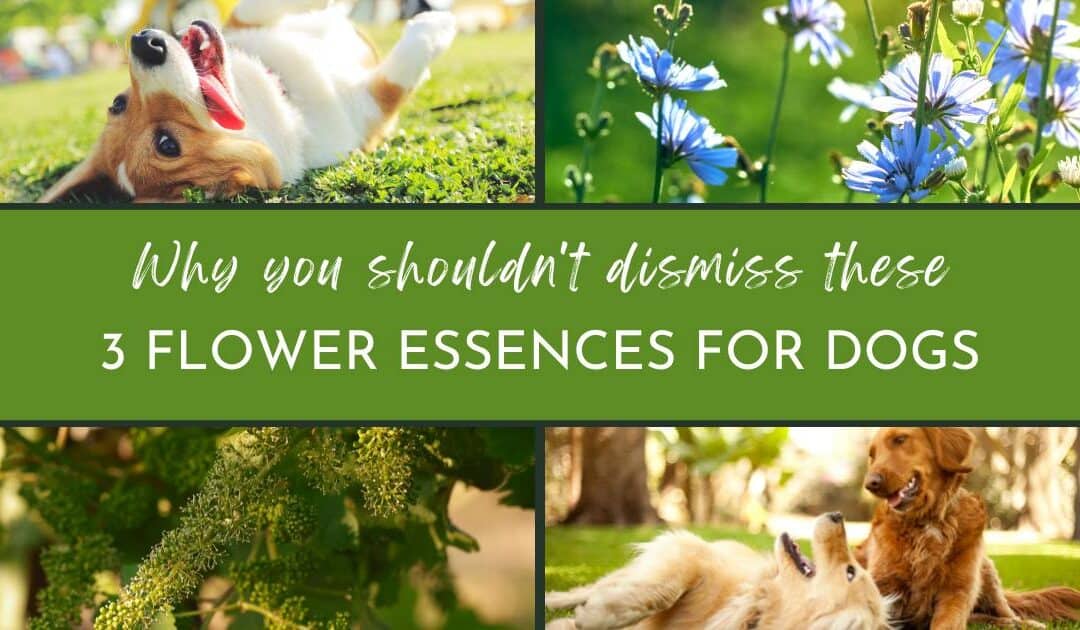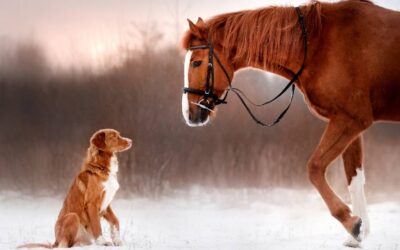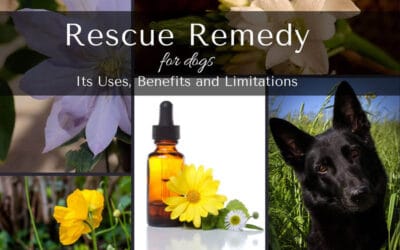Although flower essences can be of tremendous help in improving dog behavior, pet owners may be more resistant to trying certain essences than others. In this article, I’ll discuss 3 very helpful Bach flower remedies that can be a challenge to get some dog parents to try.Â
In my nearly three decades working with flower essences to improve dog behavior, three Bach flower remedies in particular have stood out as “problematicâ€, to use a currently fashionable term.
These three have often been a source of contention when recommending them to a pet owner struggling with a problem dog.
Why is that? Because saying that a dog may need one of these flower essences appears to touch a nerve. People often don’t like to associate certain motivations with their dogs.
What are the three Bach flower essences that cause such angst? Let’s look at them one by one and see what the problem is, and why it’s important to consider them for dogs.
Chicory

The first problematic essence is Chicory. When an individual (animal or human) is in a “negative state†for Chicory, they tend to be controlling, possessive, and/or manipulative. This can be outright, obvious and “in your faceâ€, or it can more subtle and creative.
They will generally behave in such a way as to get someone to react. Their behavior tends to worse around one person, rather than equally bad with everyone in general. Hence my tending to look at Chicory as flower essence for “relationship issuesâ€.
What’s the problem with recommending Chicory to dog owners? I find that people can have a heck of a hard time accepting that their dog may be controlling! Many people will come up with all sorts of unlikely explanations for their pup’s behavior, just to avoid considering this possibility.
The fact is, this tendency is actually 100% natural and normal for many dogs. Herding dogs in particular are specifically bred to be highly successful in causing other individuals to behave/respond as the dog wants them to.
Of course, what a herding dog is bred to control and manipulate is sheep, cattle, or other herd animals. But a dog that is genetically hardwired to control the behavior of others – and actually get satisfaction from it – is unlikely to never at least try the behavior on humans. It’s not an indication of poor character; in fact, it can be a sign that the dog has a strong working temperament!
So, when working with behavior problems like reactivity, separation issues, protectiveness, hyper/rowdy behavior, random guarding of objects, even compulsive behaviors, I will always take a serious look at Chicory. If the behavior seems to happen more around a particular person, and/or if the dog is a herding breed, I will almost certainly recommend that the owners at least give it a try.
And so far, I’ve found it to be tremendously helpful to restore a proper balance of caring, devotion, and trust. Without all the controlling nonsense.
Rock Water

Rock Water is a Bach flower well known to help soften and reduce emotional rigidity in people and animals. What kinds of behaviors are we talking about? Basically, behaviors associated with Rock Water tend to revolve around strict, self-imposed rules, such as “that’s not doneâ€, and “you’re not allowedâ€.
In dogs, “you’re not allowed†behavior may show up as:
- You’re not allowed on my bed
- You’re not allowed near my chewie (bone, toy, etc.)
- You’re not allowed in/near my yard
- You’re not allowed near my bowl
- You’re not allowed to look at me like that
- You’re not allowed to reach for me like that
- You’re not allowed to touch me there, etc., etc.
With these behaviors, there’s typically a “stiffness†of attitude, an inflexibility often reflected in the dog’s body language, breathing, and expression.So what is the problematic nature of Rock Water? It’s the fact that dog behaviors like this are traditionally thought of as expressions of dominance.
Now, I’m not talking about the way the term has been thrown around by some, applied to every possible misbehavior in dogs. But rather to behavior that indicates that the dog feels it has the right to correct those underneath it when they “break the rulesâ€. A dominant dog assumes that it has the right to do this (or has learned that the behavior works to get it what it wants).
But for many dog owners, the term dominance is such a turn-off that it can keep them from recognizing the true nature of their dog’s behavior problem. Which is a shame, because Rock Water can be very successful at softening those hard tendencies, and improving emotional flexibility in dogs.
And just to say, rules-based behaviors may not necessarily involve dominance or displays of aggression (although they often go together). Dogs that show no signs of dominance, but that may benefit from Rock Water, include dogs that don’t function well if their routine is broken, or if something they’re used to is different or out of place.
For instance:
- Dogs that won’t enter their crate if the bedding is out of place (real life example!).
- Dogs that have to go for walks at the exact time every day, or with the same equipment, or via the same route.
- Dogs that can’t handle a new harness, type of collar, or jacket, because it’s new.
- Dogs that predictably perform a “routineâ€, such as circling the yard perimeter, spinning in their crate, etc. (See my article on Bach flowers for compulsive behavior in dogs for more on this.)
- Show, working, and performance dogs that perform well and spontaneously at home or in familiar locations, but stiffen up and are slow and tense in new places.
In these cases, and many more, Rock Water can help the dog’s behavior become more fluid and flexible. And while it may not stop certain behaviors in their tracks, it can definitely open up a chink in the emotional armor so that training can be more effective.
Vine
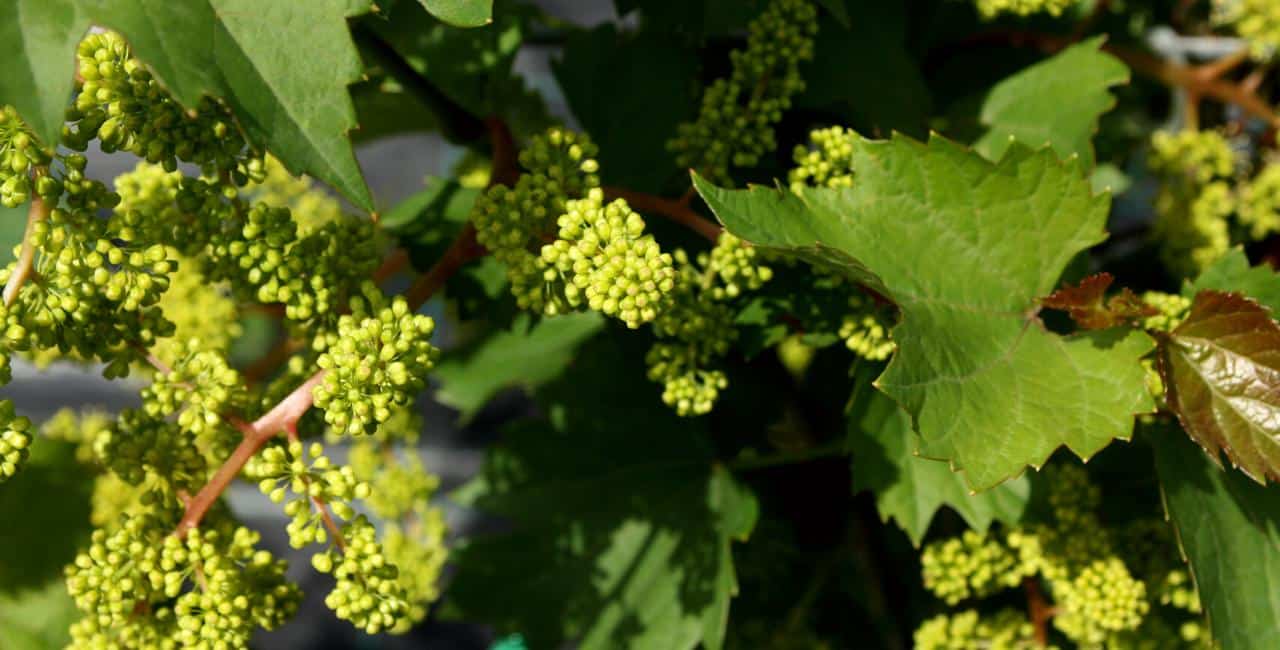
Now we turn to Vine, the Bach flower essence known for toning down bullying and forceful bossiness – behavior that may be labeled “domineeringâ€.
Suggesting that someone’s dog needs a flower essence to counteract domineering behavior generally isn’t too much of a problem when the dog is obviously using force to bully others. Certain behaviors just feel threatening and intimidating, and dog owners are open to dealing with it as such.
Some examples would be:
- Muzzle punching
- Body slamming
- Standing over, glaring, and other direct threats and intimidation
The problem lies when dogs show less straightforward signs of using physical force to get their way. For instance, behaviors like:
- Blasting through people or dogs to get to a door, a toy, food, etc.
- Bumping other animals out of the way in order to get attention, treats, etc.
- “Accidently†nipping arms, hands, ankles during play or excitement.
Most of us will tend to give the dog the benefit of the doubt, and protest that:
- He’s just a puppy!
- He’s over-exuberant!
- He just gets excited!
- He lacks impulse control!
And sometimes, that is exactly all it is. But, I find that when the behavior mainly seems to happen in order to bring about a result, it’s more likely there is some bossiness involved. In which case, Vine can help!
So, how can Vine flower essence help, and what should you expect?
I think the main benefit of Vine is that it opens up the dog to improved, more peaceful modes of communication. This probably sounds kind of odd. But in my experience, dogs that use physical force to achieve goals are basically just being dogs, and doing so because they haven’t learned more civilized (and cost-effective) methods to communicate their needs.
Vine helps dogs become open to communication that is less forceful and confrontational, and more cooperative. So, not only does it tone down the tendency to employ force, it builds the ability to use alternate ways of communicating. Which Is actually a pretty amazing change to witness.
This is why I often describe Vine as a flower essence that helps restore “positive leadership qualitiesâ€, since true leadership inspires cooperation, rather than forcing it. Because of this, Vine can be an important essence for strong-minded working dogs, to help keep them balanced.
So, if your dog shows obvious, or not-so-obvious, signs of using physical power to get his way, consider trying Vine. I’ve found that it can be a real relationship saver, especially when combined with training to help the dog learn new and better ways to communicate his needs.
Wrapping Up
Problem dog behaviors associated with controlling, threatening, and bullying behaviors can be significantly improved by the right flower essences. But taking the step to use them means that the dog owner must be willing to consider that dog can be capable of some unpleasant-seeming strategies.
I think it helps to remember that our dogs really are just doing the best they can, living as “strangers in a strange landâ€. They try things, and if they work, the behavior gets repeated.
It’s our job to help them learn better strategies, through training, consistency, patience, and sometimes, with a natural therapy like flower essences.
I hope you enjoyed this discussion of Bach flower essences that can be problematic for some dog owners. If you did, please do me the favor of sharing it with your friends!Â
Aldaron Essences’ online store closed permanently on May 31, 2023. I no longer sell flower essence formulas directly to customers.
Instead, I’m focusing on developing the Aldaron Essences blog into a premier resource on flower essences for dogs and other animals. I’ll also be expanding my dog training website, Train2Behave.com, as well as my Etsy store of mostly dog training- and breed-related apparel and gifts.
In the coming weeks, you can expect new pages on this site that will detail some of my most popular flower essence formulas for dogs. These pages will replace the old links to those products on the store. Thanks for your patience during the transition!
Best,
julie
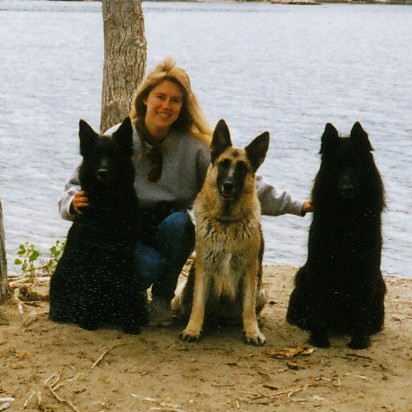
Julie Cantrell BSc is a professional dog trainer and canine behavior consultant who’s logged many thousands of hours training dogs and teaching owners since 1990. Flower essences have been part of her work with canine behavior since 1994. (Bio)

